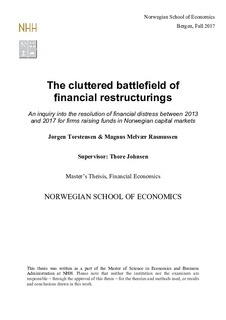The cluttered battlefield of financial restructurings : an inquiry into the resolution of financial distress between 2013 and 2017 for firms raising funds in norwegian capital markets
Master thesis
Permanent lenke
http://hdl.handle.net/11250/2486612Utgivelsesdato
2017Metadata
Vis full innførselSamlinger
- Master Thesis [4372]
Sammendrag
Following the 2014 oil price plunge, a large number of offshore firms have suffered from
financial distress. Significantly lower revenues, combined with high debt levels has impaired
oil-related industries’ debt-servicing capabilities. As a result, many firms have defaulted on
their debt obligations, sending the industries into a comprehensive wave of financial
restructurings. In this thesis, we delve into the resolution of financial distress between 2013 and
2017, for firms that are financed through Norwegian capital markets, with the purpose of
understanding the drivers, as well as the implications, of different restructuring outcomes.
The sample consists of 27 financial restructurings, involving debt restructuring and/or equity
issues aiming to alleviate the mismatch between current debt obligations and available liquid
assets. We evaluate the contributions of banks, bondholders, and shareholders in each case, and
elaborate on deviations from the absolute priority rule. Further, we assess the financial state of
the firms pre and post restructuring, including a view on what the firms can expect going
forward. Moreover, we put extra emphasis on the attractiveness of being a shareholder through
the restructuring processes.
Building on insights from key stakeholders and publicly available information, we show that
resolution of financial distress varied significantly between cases. Still, certain trends were
evident. Banks, being a large and powerful senior secured creditor, opted to extend maturities,
while showing reluctance to incur losses on the outstanding. Conversely, both secured and
unsecured bondholders providing senior debt were often converted to equity and/or partially
redeemed in cash, while suffering significant losses. Further, new equity was often issued,
mostly through private placements from the largest owners. As such, existing shares were
greatly diluted. Finally, the share prices have taken a beating through the processes, although
there are large differences between the cases. Yet, participating in the equity issues generally
has proven to be profitable, due to significant discounts.
